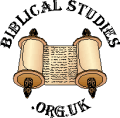This page lists all the site resources on Jeremiah by media type. If you click on any title the video, audio or document or a link to it should open up underneath.
Videos
Audios
Documents

From Annotated Old Testament Bibliography – 2016 by M. Daniel Carroll R., Hélène Dallaire, and Richard S. Hess (Denver Seminary).
*Allen, Leslie C. Jeremiah: A Commentary. OTL. Westminster John Knox, 2008. Well-informed detailed textual study focused primarily on the canonical form. Little theological reflection.
Brueggemann, Walter. A Commentary on Jeremiah: Exile and Homecoming. Eerdmans, 1998. Helpful commentary on sections with good expositional observations and insightful theological and ideological comments.
Craigie, Peter C., Page H. Kelley, and Joel F. Drinkard, Jr. Jeremiah 1-25. WBC 26. Word, 1991. Completed by the other authors after the death of Craigie. Accordingly, it is uneven in amount and quality of detail. Evangelical.
Dearman, J. Andrew. Jeremiah, Lamentations. NIVAC. Zondervan, 2002. Brief comments on text with primary focus on modern application. Evangelical.
*Fretheim, Terence E. Jeremiah. SHBC 15. Smyth & Helwys, 2002. Critically informed but not intrusive. Textual comments with substantive theological reflections by one of the more important Old Testament theologians of our time.
*Holladay, William L. Jeremiah 1-25; Jeremiah 26-52. Hermeneia. Fortress Press, 1986, 1989. A massive technical commentary with a wealth of textual and exegetical notes.
Keown, Gerald L., Pamela J. Scalise, and Thomas G. Smothers. Jeremiah 26-52. WBC 27. Word, 1995. See above under Craigie. Evangelical.
*King, Philip J. Jeremiah: An Archaeological Companion. Westminster John Knox, 1993. Very illuminating resource for understanding background to book.
Lalleman, Hetty. Jeremiah and Lamentations. TOTC 21. IVP Academic, 2013. Good, brief exegetical comments on the text. Evangelical.
Longman III, Tremper. Jeremiah, Lamentations. UBCS. Baker, 2008. (Formerly NIBC 14. Hendrickson, 2008). Solid mid-level exposition with footnotes on technical matters. Evangelical.
*Lundbom, Jack R. Jeremiah 1-20: A New Translation with Introduction and Commentary; Jeremiah 21-36; Jeremiah 37-52. AB 21A, 21B, 21C. Doubleday, 1999, 2004. An exhaustive work. Study of each passage divided into Rhetoric & Composition, Notes, and Message & Audience. Second volume contains several detailed appendices, the third a supplemental bibliography.
McKane, William. A Critical and Exegetical Commentary on Jeremiah 1-25; Jeremiah 26-52. ICC. T. & T. Clark, 1986, 1989. Focus on textual and philology issues.
Stulman, Louis. Jeremiah. Abingdon Old Testament Commentary. Abingdon, 2005. Insightful theological and ethical comments on the canonical shape of the book.
Thompson, John A. The Book of Jeremiah. NICOT. Eerdmans, 1980. The standard evangelical commentary since its publication.
Wright, Christopher J. H. The Message of Jeremiah: Against Wind and Tide. BST. IVP Academic, 2014. Offers pastor and preachers good expositional, theological, and practical insights. Evangelical.

Comments on Commentaries
An assessment of commentaries on a book of the Old & New Testament to keep you up to date with what will help in preaching and teaching in the local church.
OT: Jeremiah
Jeremiah is at the same time the prophet whose spiritual experience and biography seem to be most accessible to us and the one whose book has been, according to much modern scholarship, most transformed by a different editorial theology and the needs of a later (exilic) readership. These distinct characteristics place a heavy demand on commentators and most lean more to one direction or the other. There is no shortage of choice!
The late Robert Carroll‘s ‘OT Guide’ (Sheffield, 1989) is a good way into the modern discussion, even if one rejects his sceptical conclusions. His own approach, more fully set out in his commentary (OTL, 1986), is to focus on the first readers of the book in the Babylonian exile and ask what they in their situation of crisis would have made of it rather than what it can tell us about Jeremiah himself (not very much according to Carroll!). At the other end of the scale is the old book (not strictly a commentary) of John Skinner, Prophecy and Religion (Cambridge, 1926), which treats the whole book as the spiritual biography of Jeremiah. More recent commentaries which also take a strongly historical approach, though with more attention to the political context, are John Bright (Anchor Bible, 1965), J A Thompson (NICOT, 1980), P C Craigie and others (Word, 2 vols, 1991, 1995), and on a smaller scale R K Harrison (TOTC, 1973). William Holladay‘s very large Hermeneia commentary (2 vols, 1986, 1989) is similar and full of useful detail, but the overall approach is somewhat skewed by his theories about the coherent structure (‘architecture’) of the book and the chronology of Jeremiah’s utterances.
In between are those which acknowledge the poetry of the book (or most of it) as giving us direct access to Jeremiah’s own words but see the prose sermons and narratives as in varying degrees refracting his teachings and experiences through a ‘deuteronomistic’ lens. Here belong Ernest Nicholson‘s succinct commentary on the NEB (CUP, 2 vols, 1973, 1975), Ronald Clements‘s very readable and theological exposition in the Interpretation series (John Knox, 1988) and William McKane‘s ICC (T. & T. Clark, 2 vols, 1986, 1996) which, if too dense for most readers, provides the fullest analysis of the Hebrew text and its problems that is available. Douglas Jones‘s NCB (Harper Collins, 1992) also belongs here and comes closest to my idea of the best medium-sized commentary for general use, with its detailed explanation of particular words and phrases and its sensible treatment of larger issues.
The ‘rhetorical criticism’ of Jack Lundbom (Anchor Bible, so far only ch. 1-20, 1999) and the ‘synchronic’ focus on the final form of the text of Kathleen O’Connor in the one-volume Oxford Bible Commentary (ed. John Barton and John Muddiman, 2001) offer examples of different kinds of ‘literary’ approach to the book.
The preacher who is looking for immediately usable material that is based on sound scholarship will find it in Robert Davidson‘s Daily Study Bible (Saint Andrew Press, 2 vols, 1983, 1985) and in Walter Brueggemann‘s attractively titled volumes in the ITC (Eerdmans),’To Pluck Up, To Tear Down (1988) and To Build, To Plant (1991). Of special interest, though again not strictly a commentary, is Philip King‘s Jeremiah: An Archaeological Companion (Westminster/JKP, 1993), which provides many vivid illustrations of the themes and images of Jeremiah’s message.
Graham Davies, Professor of Old Testament Studies, Cambridge University

Videos and Audios and Texts of each of the 30 lectures available here











